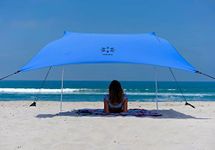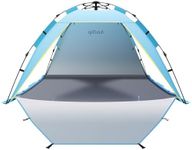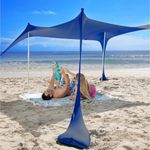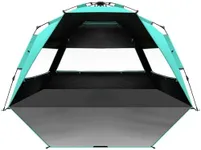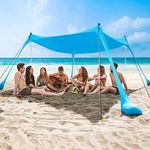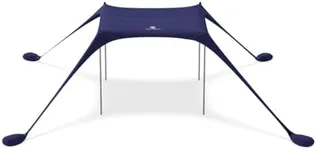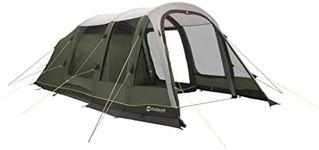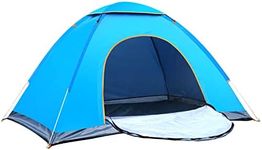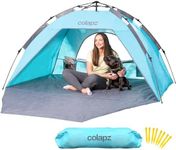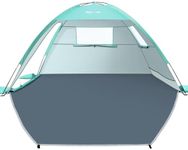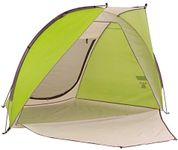Buying Guide for the Best Beach Tents
Choosing the right beach tent can make your day at the beach more enjoyable and comfortable. Beach tents provide shade, protection from the wind, and a place to store your belongings. When selecting a beach tent, consider factors such as size, ease of setup, material, and additional features. Understanding these key specifications will help you find the perfect beach tent for your needs.SizeThe size of the beach tent is crucial because it determines how many people can comfortably fit inside and how much space you have for your belongings. Beach tents come in various sizes, from small one-person tents to large family-sized tents. If you plan to use the tent alone or with one other person, a smaller tent will suffice. For families or groups, opt for a larger tent to ensure everyone has enough room to relax.
Ease of SetupEase of setup refers to how quickly and effortlessly you can assemble the beach tent. This is important because you don't want to spend a lot of time struggling with complicated instructions when you could be enjoying the beach. Look for tents with simple designs, such as pop-up tents or those with fewer poles and attachments. If you're not very handy or prefer convenience, choose a tent that is known for its quick and easy setup.
MaterialThe material of the beach tent affects its durability, weight, and protection from the elements. Common materials include polyester, nylon, and canvas. Polyester and nylon are lightweight and water-resistant, making them ideal for beach use. Canvas is heavier but more durable. Consider how often you'll use the tent and the conditions you'll face. For frequent beachgoers, a lightweight and water-resistant material is best. For occasional use, durability might be more important.
UV ProtectionUV protection is a critical feature for beach tents because it shields you from harmful sun rays. Tents with UV protection are made from materials that block or absorb UV radiation, reducing your risk of sunburn and skin damage. Look for tents with a high UPF (Ultraviolet Protection Factor) rating, ideally 50+ for maximum protection. If you plan to spend long hours at the beach, prioritize tents with strong UV protection.
VentilationVentilation refers to the airflow within the beach tent, which is important for keeping the interior cool and comfortable. Good ventilation prevents the tent from becoming stuffy and overheated. Look for tents with mesh windows, vents, or open designs that allow air to circulate freely. If you often visit hot and humid beaches, choose a tent with excellent ventilation to ensure a pleasant experience.
PortabilityPortability is about how easy it is to carry and transport the beach tent. This includes the weight of the tent and whether it comes with a carrying bag or straps. Lightweight tents are easier to carry, especially if you have other beach gear. Check the packed size of the tent to ensure it fits in your car or can be carried comfortably. If you have a long walk to the beach, prioritize a tent that is compact and easy to transport.
Additional FeaturesAdditional features can enhance your beach tent experience. These may include sand pockets for stability, interior pockets for storage, doors for privacy, and waterproof floors. Consider what extra features would be beneficial for your beach trips. For example, sand pockets can prevent the tent from blowing away, while interior pockets can help keep your belongings organized. Choose a tent with features that match your specific needs and preferences.
